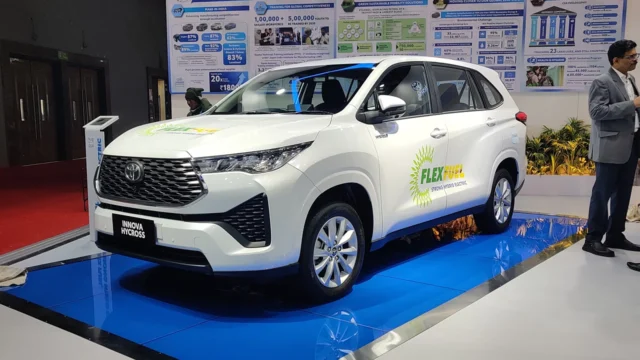Transition to 100% Ethanol-Run Vehicles Accelerates


Union Minister Nitin Gadkari recently highlighted the strides made by Indian auto companies towards eco-friendly transportation, emphasizing their shift towards 100% ethanol-run cars. Speaking to the media, he revealed that numerous local firms are gearing up to manufacture vehicles that solely rely on ethanol, a significant step towards sustainability.
Expansion in Ethanol-Run Vehicle Production
Gadkari unveiled that major automobile players like Toyota, Tatas, and Suzuki are actively developing facilities to produce vehicles equipped with flex engines that can operate entirely on ethanol. This development coincides with Toyota’s recent announcement of a new production plant in Aurangabad, Maharashtra. This facility represents a significant investment of ₹200 billion and marks a pivotal advancement in the adoption of flex engine technology.
Advancements in Two-Wheeler Segment
In addition to cars, prominent Indian two-wheeler manufacturers such as Bajaj, TVS, and Hero are also venturing into the production of ethanol-based motorcycles and scooters. These initiatives underscore a broader industry trend towards alternative fuels.
Infrastructure and Environmental Benefits
Gadkari pointed out that the infrastructure to support ethanol fuel, including dedicated ethanol pumps, would soon become as commonplace as petrol stations. He highlighted the dual benefits of this shift: reducing environmental pollution and cutting operational costs. Furthermore, the transition is poised to significantly benefit the agricultural sector, providing a stable demand for ethanol derived from sugarcane juice, molasses, and corn.
Toyota’s Innovations and Future Prospects
Earlier, in August 2023, Toyota Kirloskar Motors had showcased a prototype of a BS-VI-compliant electrified flex-fuel car. This model, based on the Toyota Innova HyCross, can travel 40% of its range on ethanol and the remaining 60% using electric power, with the conventional petrol engine remaining inactive. This innovation highlights the potential for substantial reductions in carbon emissions.
Gadkari also emphasized the broader implications for India’s agricultural economy, predicting a surge in demand for ethanol that could transform the sector.
The advancements in ethanol technology by Indian manufacturers, supported by substantial investments and government advocacy, signify a pivotal shift towards sustainable and economically beneficial automotive technologies.
Source link



